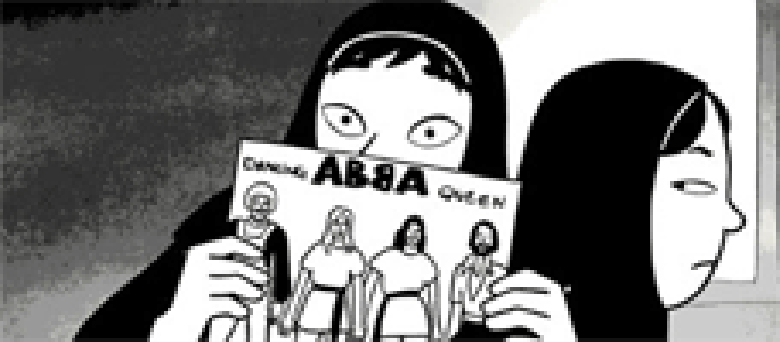Reviews
Vincent Paronnaud and Marjane Satrapi
France / USA, 2007
Credits
Review by Victoria Large
Posted on 29 October 2012
Source Sony Pictures Classics 35mm print
Related articles
Features What is Animation?
The emphasis, in recent years, on the (admittedly stunning) advances in computer animation, which is oft-credited with giving characters and settings a heretofore unseen level of realism, sometimes leads us to forget one of the most magical elements of animated films. They don’t have to look real. They’re bound by nothing about the animators’ imaginations, and they can be at their most effective when they’re at their most expressionistic. One would be hard-pressed to disagree with this notion after seeing Persepolis, a film based on Marjane Satrapi’s graphic novel memoirs of the same name and adapted for the screen by Satrapi and fellow comics artist Vincent Paronnaud.
A coming-of-age story with a difference, Persepolis follows Marjane as she grows from a feisty, Bruce Lee-loving little girl living in Iran at the time of the Islamic Revolution to a disaffected outsider (first in Austria and then back in the country of her birth), to a young woman who knows too well that freedom and adulthood have their price. As fluid as Marjane’s developing identity and worldview, the film’s largely black-and-white and refreshingly unique visuals bring us into a world of memory and emotion. Imposing and distorted women express their disapproval in little Marjane’s sneakered feet and Michael Jackson lapel pin (symbols of western decadence), their bodies nightmarishly growing and twisting. Marjane’s awkward phase is ushered in through a series of grotesque transformations worthy of Chuck Jones. A seemingly idyllic romance between Marjane and her playwright boyfriend unfolds in a hysterical flurry of hearts-and-flowers sentiment. The possibilities of what we will see next are endless and endlessly entertaining. Perfectly complemented by Olivier Bernet’s score, the dreamy look of Persepolis is almost enough reason to recommend seeing it (on the big screen, if you can).
Yet as entrancing as the film’s visuals are, the hard truths couched in its swirling imagery are what make it so compelling. The temptation to view Persepolis through a strictly political lens is understandable, but this deeply personal story concerns itself with themes that are universal, transcending any national borders, any specific time and place. Persepolis asserts that perhaps there isn’t a single moment that defines us: as politically aware or socially responsible, as independent or as comfortable in our skins. There is instead a series of victories and setbacks, snatches of happiness and serious sacrifices. The film is by turns aching and funny, sometimes at the same time. One of the most hilarious sequences finds Marjane bouncing back from the depths of suicidal despair and facing her life with a newfound determination, a cheeky inspirational montage accompanied by her rendition of Survivor’s Rocky III anthem “Eye of the Tiger,” sung loudly off-key in heavily-accented English.
Throughout Marjane’s search for a place in a world that seems determined to shut her out, a variety of the young woman’s family members infuse the story with a bit more experience and wisdom than our heroine yet possesses. Particularly pivotal is the presence of Marjane’s grandmother, a profoundly memorable character voiced by ninety-year-old actress Danielle Darrieux. This grandmother is intelligent, level-headed, and warmly funny; she’s a woman who cheers her granddaughter’s rebellious streak, who insists that the first marriage is only practice, who fills her brassiere with jasmine petals for their smell. Satrapi and Paronnaud have rendered the grandmother so richly, and Darrieux inhabits her so vividly, that by the close of the film, a small, simple smile on her hand-drawn face speaks volumes.
There are other excellent performances. Chiara Mastroianni voices the eldest incarnation of Marjane opposite her real-life mother Catherine Deneuve who plays - who else? - Marjane’s mother. As a pair, they are particularly moving in a scene just after Marjane’s hasty marriage, when she finds her tearful mother in the restroom at the reception. François Jerosme also leaves a strong impression as Marjane’s activist uncle. Yes, an English-language version of the film will be made available, but only the most subtitle-phobic moviegoers could feel justified in skipping the work of the film’s original French-language cast.
Well-acted, gorgeous to look at, and spilling over with ideas, Persepolis is an uplifting experience by virtue of being so blessedly unusual, and for transporting its viewers so effectively to a world that many have never seen. But don’t look for a happy ending, exactly, or any easy answers from Satrapi or from me. The movie aims to shake us up, the way only the best art can, and it reminds us that wherever and whoever we are (or were, or will be), we’re all making the same turbulent journey.
We don’t do comments anymore, but you may contact us here or find us on Twitter or Facebook.



